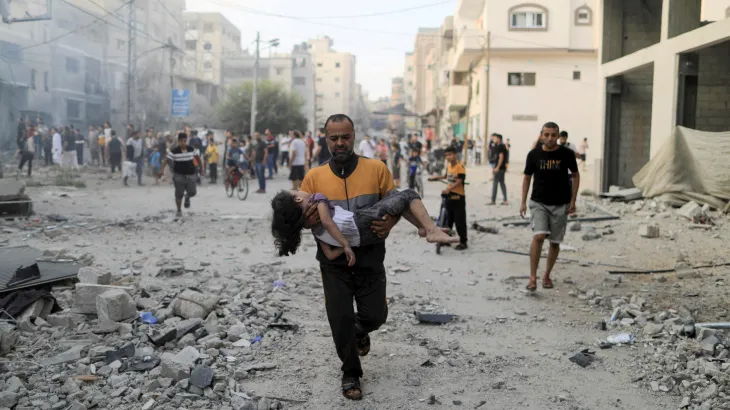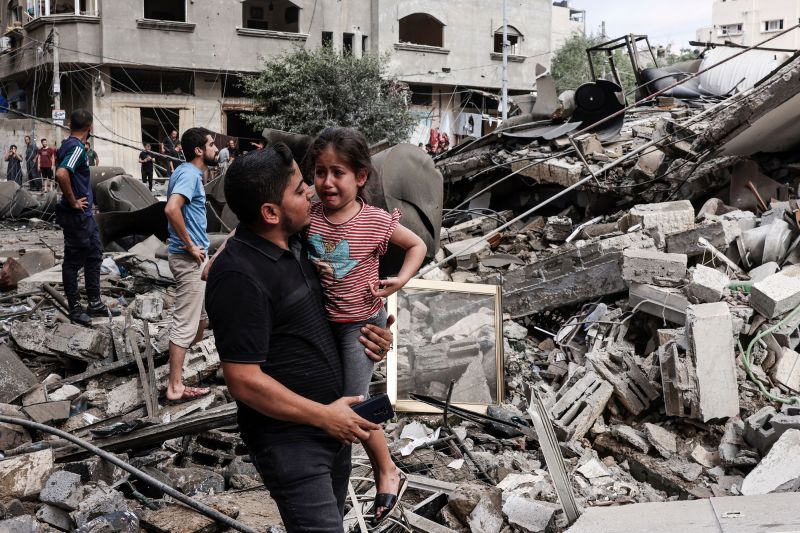US News
Fighting in Gaza: Understanding the Complex Dynamics
Published
9 months agoon
By
Admin
Introduction
The conflict in Gaza has been a longstanding issue that has gripped the attention of the world. Understanding the intricacies of this conflict is essential for fostering empathy and seeking potential solutions. This article delves into the various aspects of the fighting in Gaza, shedding light on its historical backdrop, geopolitical complexities, and the human toll it has taken.
Historical Background
The roots of the fighting in Gaza trace back decades, with a series of geopolitical, historical, and ideological factors contributing to the ongoing strife.
The Birth of the Conflict
The conflict can be traced back to the mid-20th century, with the establishment of the state of Israel in 1948, leading to the displacement of Palestinian communities.
Occupation and Resistance
The subsequent occupation of Gaza by Israel in 1967 marked a significant turning point, leading to increased resistance movements.
Peace Efforts and Unresolved Issues
Despite numerous attempts at peace negotiations, underlying issues remain unresolved, perpetuating the cycle of violence.
Geopolitical Factors

Understanding the geopolitical landscape is crucial in comprehending the complexities surrounding the fighting in Gaza.
Regional Alliances
The conflict in Gaza is deeply intertwined with regional alliances and rivalries, influencing the dynamics on the ground.
International Diplomacy
Global powers play a pivotal role in mediating and influencing the trajectory of the conflict, often shaping its course.
Socio-Economic Impacts
The conflict has far-reaching socio-economic repercussions, affecting the livelihoods and well-being of the people in Gaza.
Humanitarian Crisis
The fighting in Gaza has led to a severe humanitarian crisis, with dire consequences for the civilian population.
Displacement and Refugees
Generations of Gazans have experienced displacement, leading to a refugee crisis with profound psychological and social implications.
Access to Basic Necessities
Restricted access to essentials like clean water, food, and healthcare exacerbates the challenges faced by the population.
Psychological Trauma
Years of conflict have taken a toll on the mental health of Gazans, particularly children, who grow up amid violence and instability.
The Role of Media and Perception
Media portrayal plays a critical role in shaping public opinion and international responses to the fighting in Gaza.
Bias and Objectivity
Media bias can significantly impact the perception of the conflict, making it imperative to seek balanced sources of information.
Advocacy and Awareness
Raising awareness about the nuanced realities of the conflict is essential for fostering empathy and informed discourse.
FAQs
Is there a possibility of a lasting peace in Gaza?
Achieving lasting peace in Gaza requires concerted efforts from all stakeholders, addressing core issues and fostering mutual understanding.
What are the key stumbling blocks in peace negotiations?
Core issues such as territorial disputes, the status of Jerusalem, and the right of return for Palestinian refugees remain contentious points.
How do regional powers contribute to the conflict?
Regional powers often provide political, financial, and military support to various factions, further entrenching the conflict.
What role does international law play in the conflict?
International law provides a framework for addressing grievances and seeking resolutions, but its enforcement remains a challenge.
How can individuals contribute to peace-building efforts in Gaza?
Supporting organizations that focus on humanitarian aid, education, and grassroots initiatives can make a tangible difference.
What are the prospects for a two-state solution?
The two-state solution remains a subject of debate, with varying perspectives on its feasibility and implementation.
Conclusion
Understanding the fighting in Gaza necessitates a nuanced appreciation of its historical roots, geopolitical intricacies, and human impact. By fostering empathy and seeking informed discourse, we can contribute to the quest for a more peaceful future in the region.

The Fascinating World of Cats: An In-depth Exploration

How to Find the Right Surgical Technician Certification Online

Need to know the Sillim Pool Salon reservation

Get Free Company Directory Listings and sites for free advertising on Workerty.

Top 25 College Football Poll for 2024

Macron Keeps France’s Prime Minister in Place for ‘Stability of the Country’ After Chaotic Election

Brandon Marsh Wife:Know All About Her

Rena Monrovia: When You Transport Something by Car

Halo: Combat Evolved (2003) – Game Icons and Banners

Old Navy | Navyist Rewards Mastercard

How can online food delivery sales increase and attract the maximum number of customers in 2023?

MEP BIM: Revolutionizing Building Infrastructure Design

Revolutionizing Industries with ChatGPT

Virtual Reality Rental: A Futuristic Experience

Negin Behazin vs Dignity Health: Comprehensive Comparison

Unlocking the Potential of cryptonewzhub.com Internet

Resolving the Israeli-Palestinian Conflict: A Comprehensive Analysis

iPhone 14 Pro Max: Unveiling the Next Level Innovation

Skillful Passion: Wisconsin’s Dominant Volleyball Team

Unraveling the Mystery: Robert Card’s Tragic Passing

The Fascinating World of Cats: An In-depth Exploration

How to Find the Right Surgical Technician Certification Online

Need to know the Sillim Pool Salon reservation

Get Free Company Directory Listings and sites for free advertising on Workerty.

Top 25 College Football Poll for 2024

Macron Keeps France’s Prime Minister in Place for ‘Stability of the Country’ After Chaotic Election

Brandon Marsh Wife:Know All About Her

Rena Monrovia: When You Transport Something by Car

Halo: Combat Evolved (2003) – Game Icons and Banners



